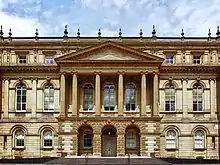Halpern v Canada (AG)
Halpern v Canada (AG), [2003] O.J. No. 2268 is a June 10, 2003 decision of the Court of Appeal for Ontario in which the Court found that the common law definition of marriage, which defined marriage as between one man and one woman, violated section 15 of the Canadian Charter of Rights and Freedoms.
| Halpern v Canada (AG) | |
|---|---|
 | |
| Court | Court of Appeal for Ontario |
| Full case name | Hedy Halpern and Colleen Rogers, Michael Leshner and Michael Stark, Aloysius Pittman and Thomas Allworth, Dawn Onishenko and Julie Erbland, Carolyn Rowe and Carolyn Moffatt, Barbara McDowall and Gail Donnelly, Alison Kemper and Joyce Barnett v Attorney General of Canada, The Attorney General of Ontario, and Novina Wong, The Clerk of the City of Toronto |
| Decided | June 10, 2003 |
| Case history | |
| Appealed from | Ontario Superior Court |
| Court membership | |
| Judges sitting | Roy McMurtry C.J.O, James MacPherson, Eileen Gillese JJ.A. |
| Legal |
|---|
|
Reference Re Same-Sex Marriage Halpern v Canada (AG) Civil Marriage Act |
| Parliament |
|
38th House · 38th Senate 39th House · 39th Senate |
| Same-sex marriage by province |
| Related |
|
Civil unions in Quebec Adult interdependent relationship in Alberta Domestic partnership in Nova Scotia Common-law relationships in Manitoba |
Background
The roots of the case began in December 2000 at the Metropolitan Community Church of Toronto, when pastor Brent Hawkes began issuing banns of marriage[1] in advance of performing wedding ceremonies for two same-sex couples—Kevin Bourassa and Joe Varnell, and Anne and Elaine Vautour—on January 14, 2001.[2] Because banns of marriage are accepted as a fully legal way to perform a marriage without the need for a city-issued marriage license, but marriages performed under either process require certification by the provincial registrar, the banns created a legal vacuum that would force a court case.[2]
Over the course of the year several other same-sex couples, among them Hedy Halpern and Colleen Rogers, and Michael Leshner and Michael Stark, joined the court challenge, which began hearings at the Ontario Superior Court in November 2001.[3]
Superior Court ruling
On July 12, 2002, the Superior Court ruled that marriage rights must be extended to same-sex couples, but it suspended the ruling for a period of two years to permit the Legislative Assembly of Ontario time to comply with the ruling through the legislative process.[4] However, as the Constitution of Canada provides that the definition of marriage is under federal jurisdiction while only the implementation is left to the provinces,[5] the decision left the situation unclear until the government of Jean Chrétien announced on July 29 that they would appeal.[6]
Court of Appeal
The Ontario Court of Appeal handed down its ruling on June 10, 2003.[7]
The unanimous Court found that the exclusion of same-sex couples was a clear violation of the Charter and moreover did not constitute a "reasonable infringement" under section 1. In this respect the judgment followed much of what had been ruled elsewhere.[7]
The court also held that there was to be no suspension of the remedy as it applied to the general population, and that the new definition allowing same-sex couples to marry would take effect immediately.
Results
Leshner and Stark became the first gay couple to be issued a marriage license after the decision,[8] while Bourassa and Varnell and the Vautours became the first legally recognized same-sex marriages overall since their marriages were deemed legal as of the date of the original ceremonies.[7] A few months later, however, Bourassa and Varnell were denied entry to the United States when travelling to attend a human rights conference, because the United States Customs agent refused to accept the validity of their marriage.[9]
In the next two years following the decision, courts in seven of Canada's other nine provinces and one of its three territories also legalized same-sex marriage in their jurisdictions before the Parliament of Canada passed the Civil Marriage Act in 2005.
The Globe and Mail, in choosing the "Nation Builders of the year," selected the judges involved in the case, namely Chief Justice Roy McMurtry, Eileen Gillese and James MacPherson,[10] while the Canadian edition of Time selected Stark and Leshner as its Canadian newsmakers of the year.[11]
See also
References
- "Gay pastor 'called to lead people to freedom' ; Puts same-sex marriages on political agenda". Toronto Star, December 17, 2000.
- "Same-sex couples preparing to tie knot: Weddings tomorrow". National Post, January 13, 2001.
- "Same-sex marriage challenge begins". The Globe and Mail, November 6, 2001.
- "Gay activists rejoice as Ontario ruling paves way for same-sex marriages". Canadian Press, July 12, 2002.
- "Ontario weighs gay marriage options". Guelph Mercury, July 17, 2002.
- "Feds to appeal Ontario same-sex court ruling". CTV News, July 29, 2002.
- "Appeals court declares same-sex marriage protected: Two Ontario men become legally married". Sudbury Star, June 11, 2003.
- "First same-sex wedding conducted after court win". Victoria Times-Colonist, June 11, 2003.
- "Gay couple denied U.S. entry". Prince George Citizen, September 19, 2003.
- Anderssen, Erin (December 13, 2003). "Doing Canada justice" (PDF). The Globe and Mail. p. F.5.
- "Gay couple named newsmaker". The Western Star, December 22, 2003.
Further reading
- Decoste, Frederick C. (2003). "The Halpern Transformation: Same-Sex Marriage, Civil Society, and the Limits of Liberal Law". Alberta Law Review. 41 (2): 619–642. ISSN 1925-8356. 2003 CanLIIDocs 145.
- Huscroft, Grant A. (2004). ""Thank God We're Here": Judicial Exclusivity in Charter Interpretation and Its Consequences". The Supreme Court Law Review: Osgoode’s Annual Constitutional Cases Conference. 25 (1): 241–267. doi:10.60082/2563-8505.1065. 2004 CanLIIDocs 444.
- Lloyd, Julie C. (2003). "Case Comment: Halpern v. Canada (A.G.)". Alberta Law Review. 41 (2): 643–655. ISSN 1925-8356. 2003 CanLIIDocs 146.
